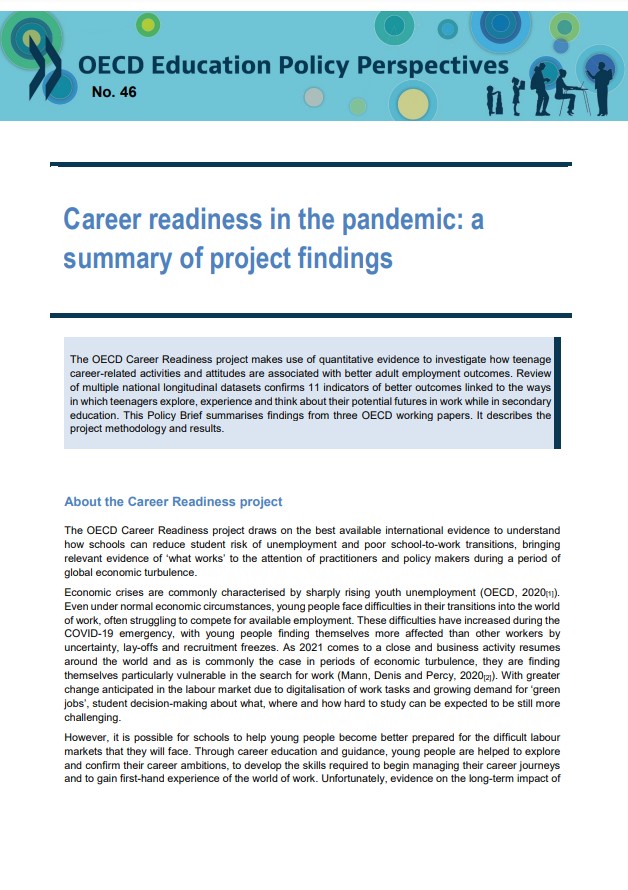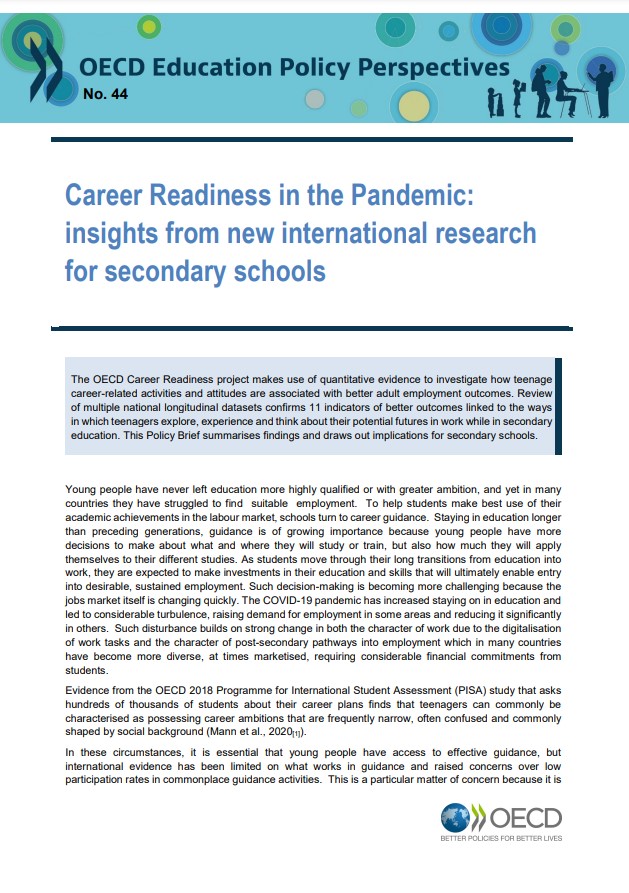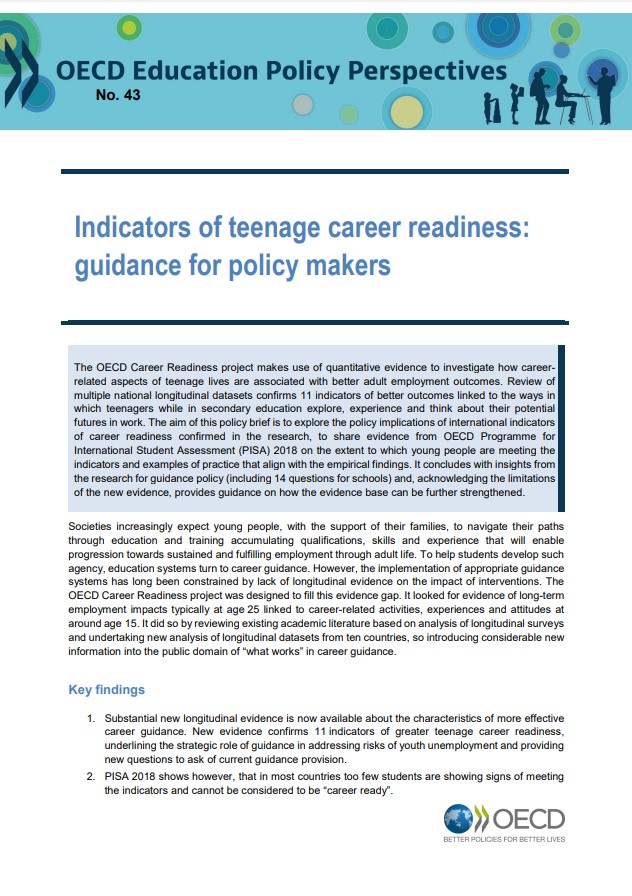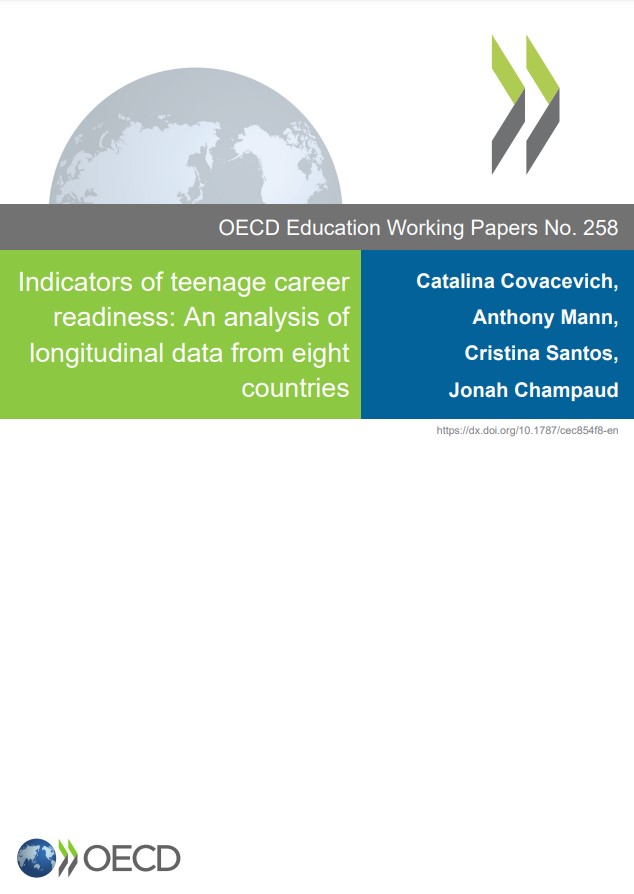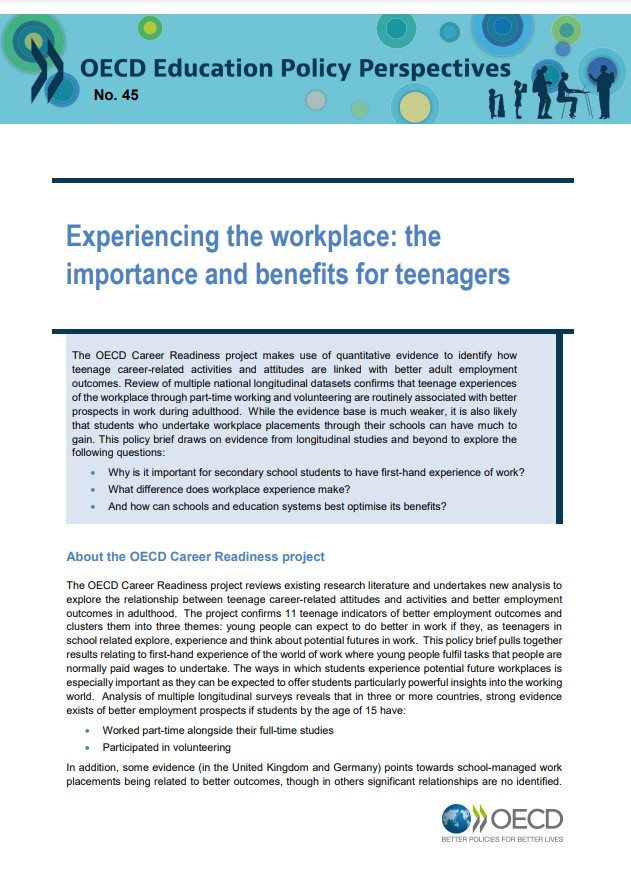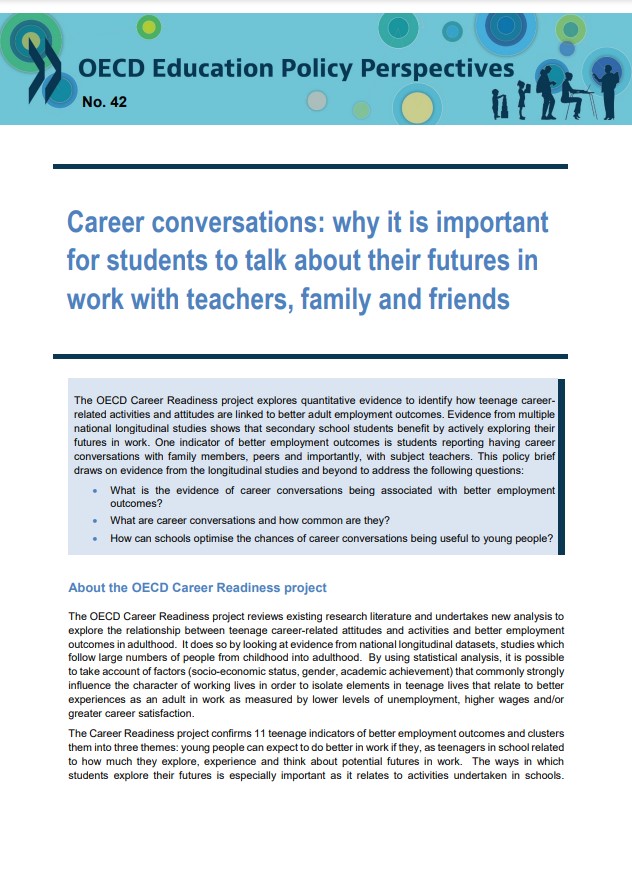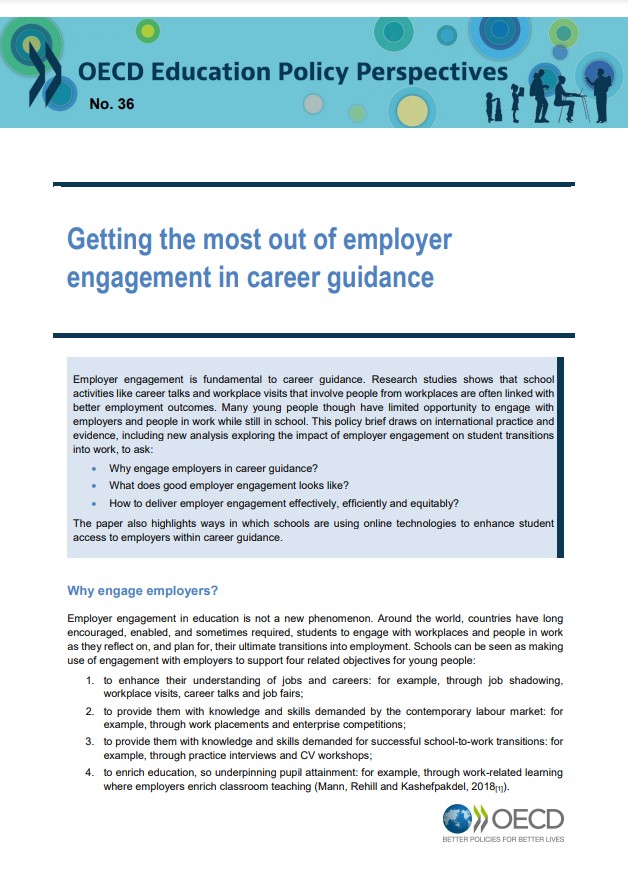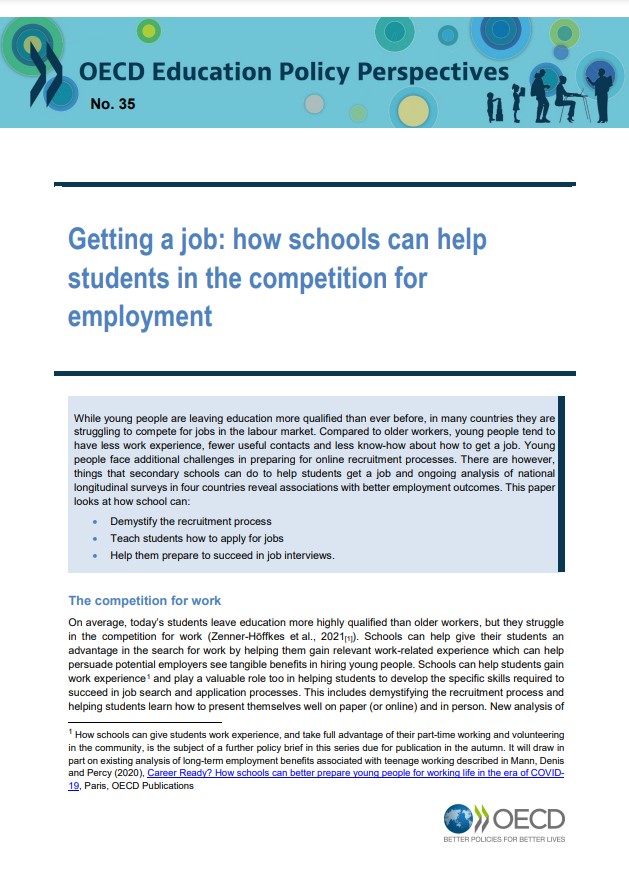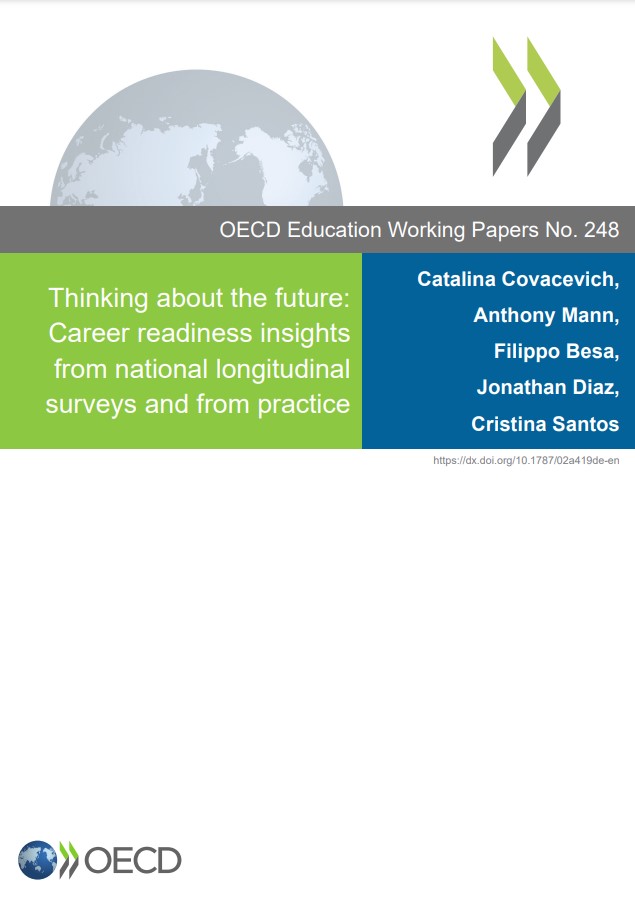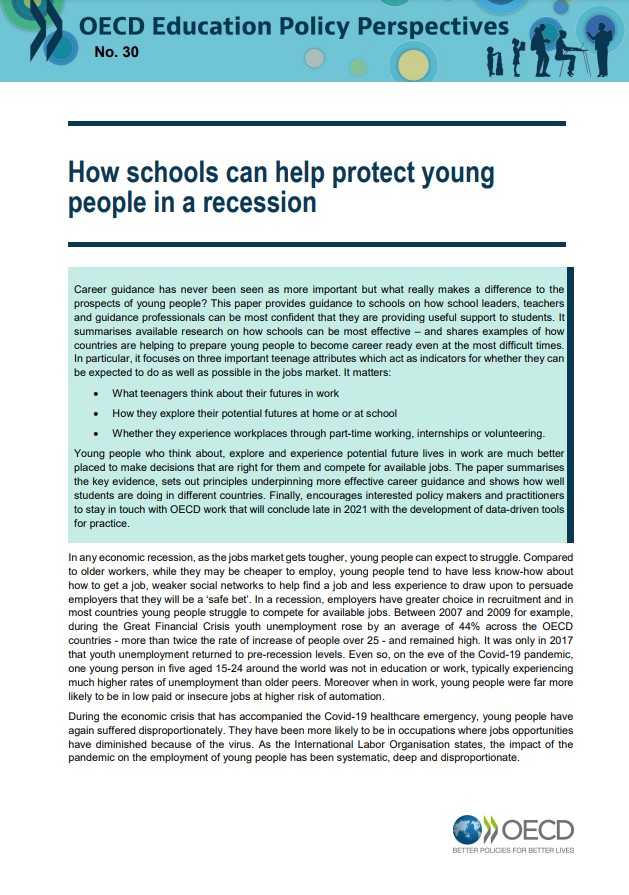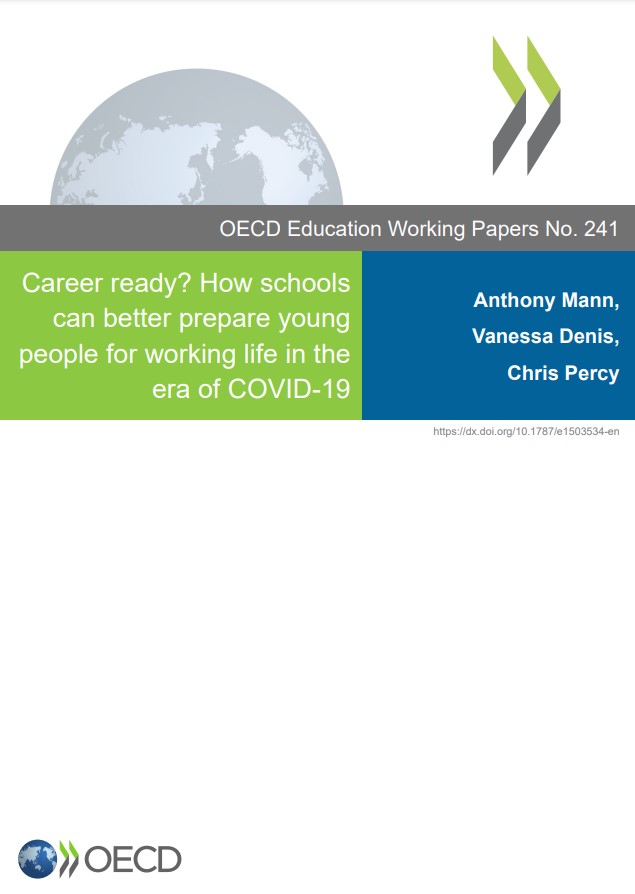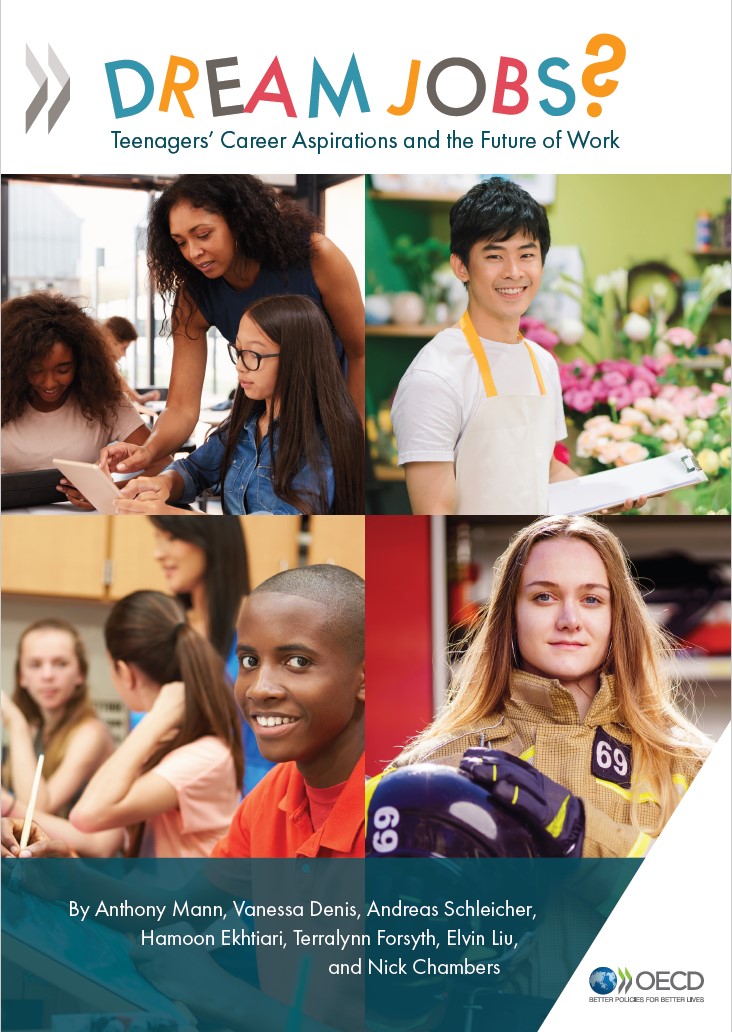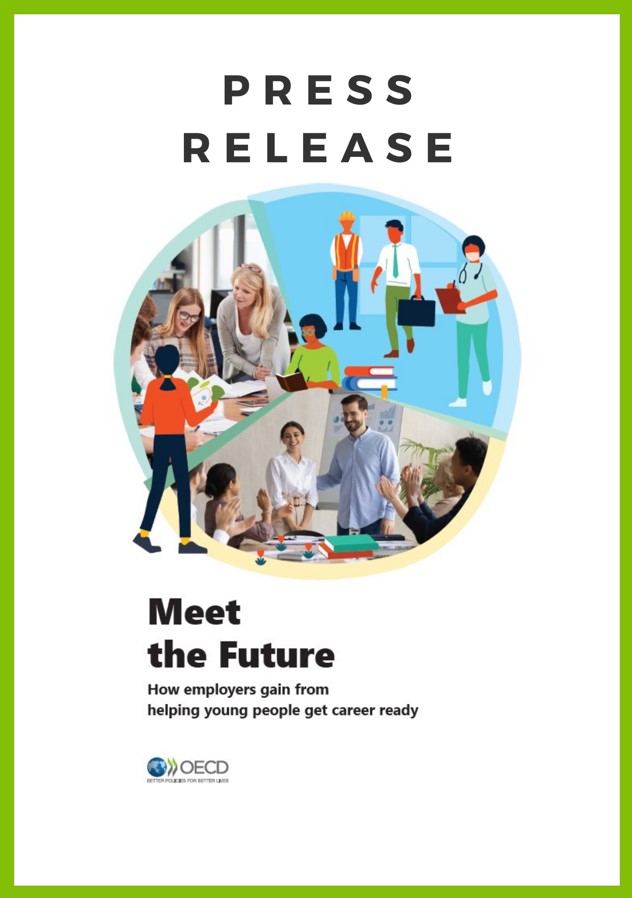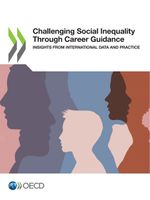Resources
Publications and Resources
The OECD Career Readiness project publishes working papers, policy briefs, among other publications, at a regular basis. OECD Working Papers set out the results of new analysis exploring links between teenage career-related attitudes, experiences and activities and better employment outcomes (in terms of earnings, employment levels and career satisfaction). OECD Policy Briefs are short papers that explore the implications of international research for national policy and practice.
Below you can find various project publications, as well as other resources from external sources.
Our Project Brochure:
How youth explore, experience and think about their future: A new look at effective career guidance
Career Readiness Publications
Working Papers, Chapters and Country Reviews
Challenging Social Inequality Through Career Guidance: Insights from International Data and Practice
(February 2024)
This report explores how school-level career guidance systems can more effectively respond to social inequalities. It draws on new analysis of PISA and PIAAC data and builds on the OECD Career Readiness Indicators to review the impact of inequalities related primarily to socio-economic background, gender and migrant status/ethnicity on the character of educaiton-to-work transitions. The data analysis identifies additional barriers facing certain demographic groups in converting human capital into successful employment. It also finds that teenage access to career development is strongly patterned by the demographic characteristics of students. Consequently, the report highlights a range of career guidance interventions that can be expected to mitigate the negative impact of inequalities on student outcomes, enabling fairer access to economic opportunities. The report concludes by reviewing how the innovative new Career Education Framework in New Brunswick (Canada) systematically addresses inequalities within K-12 provision.
Career readiness review: The Commonwealth of Virginia, United States
(December 2023)
This report assesses how the United States Commonwealth of Virginia is preparing young people for their working lives through career development. It builds on OECD longitudinal analyses which identify forms of career development that can be most confidently associated with better employment outcomes for young people. Collecting data from current secondary school students and young adults in the labour market, the report provides an oversight of career development in Virginia. It then explores the extent to which students are being effectively, efficiently and equitably prepared for thier working lives through career guidance programmes. Career rediness is a policy of high importance and the report identifies many strengths within the Virginia system.
Career readiness: In Latin America and the Caribbean
(May 2023)
This chapter focuses on how well young people (aged 15-24) living in Latin American and the Caribbean (LAC) countries are being prepared by their schools for their adult working lives. Despite a remarkable recent increase in attainment levels by young people in Latin America, they are still struggling in the labour market and young adults are much more likely to experience unemployment than people over the age of 25. PISA data from 10 LAC countries show that teenagers in secondary education are struggling to form clear expectations about their future careers. Their expectations about occupations are highly concentrated in a small number of largely professional jobs and are poorly aligned with actual patterns of labour-market demand.
Indicators of teenage career readiness: An analysis of longitudinal data from eight countries
(October 2021)
This paper looks for further evidence of the link between teenage activities, experiences and career-related thinking and adult career outcomes by analysing 10 new datasets from eight countries. Overall, the results of this paper find further evidence that secondary school students who explore, experience and think about their futures in work frequently encounter lower levels of unemployment, receive higher wages and are happier in their careers as adults. The findings of this paper are analysed together with the evidence from the two previous working papers of the Career Readiness project, concluding that there is international evidence to support 11 out of the 14 potential indicators that were explored as indicators of career readiness.
(June 2021)
This paper explores how teenage thinking about jobs and careers relates to adulthood labour market outcomes. The OECD working paper Career Ready? How schools can better prepare young people for working life in the era of COVID-19 identifies career certainty, alignment and ambition as relevant indicators related to career thinking. This paper extends analysis of these indicators to new longitudinal datasets from Australia, Denmark, and Switzerland, and incorporates two new indicators, instrumental motivation and career concentration. The findings provide further evidence that teenage career ambition, certainty, alignment, instrumental motivation and broad occupational expectations relate to positive employment outcomes, including in periods of economic turbulence. However, this is not always the case and on some occasions, this association is found only in specific subgroups. Finally, the paper presents evidence from the academic literature, analysis of OECD PISA data and accounts from practitioners, which focus on ways in which schools can foster students’ career thinking.
Career ready? How schools can better prepare young people for working life in the era of COVID-19
(December 2020)
The focus of this working paper is on how secondary schools can optimise young people’s preparation for adult employment at a time of extreme labour market turbulence. By reviewing academic analysis of national longitudinal datasets, it is possible to identify indicators of comparative adult success. How teenagers (i) think about their futures in work and what they do to (ii) explore and (iii) experience workplaces within and outside of schools is consistently associated with better than expected employment outcomes in adulthood. Data-driven career guidance will take such indicators into account within delivery. Analysis of the Programme for International Student Assessment (PISA) 2018 illustrates substantial variation in the extent of such career readiness between and within countries. Variation in career readiness is particularly associated with disadvantage. More effective education systems will ensure schools systematically address inequalities in teenage access to information and support in preparing for working life.
Policy Briefs
Career guidance, social inequality and social mobility: Insights from international data
(March 2024)
This Policy Brief draws on evidence from the OECD Career Readiness project to explore the following questions: how does socio-economic status shape the career development of young people? / how can schools challenge social inequality and enhance social mobility through guidance interventions?
Career talks with guest speakers: A guide to delivering an effective career development activity
(May 2023)
This Policy Brief summarises available evidence on the impact of teenage career talks on adult employment outcomes; draws on the wider research literature and examples of practice in some countries to illustrate why and how career talks can be expected to benefit students; and, provides a step-by-stpe guide to the effective design of career talks in person and online.
Job shadowing: A guide to delivering an effective career development activity
(November 2022)
This Policy Brief summarises evidence on the impact of teenage job shadowing on adult employment outcomes; presents international data on the characteristics of students who job shadow; draws on the research literature and national examples of practice to illustrate why and how job shadowing can be expected to benefit students and provides a step-by-step guide to the effective design of job shadowing programmes.
Career readiness in the pandemic: A summary of project findings
(November 2021)
This Policy Brief summarises findings from three OECD working papers that looked for evidence of more positive adult employment outcomes linked to teenage participation in career development activities. It describes the project methodology and results which confirm 11 indicators of greater career readiness.
Career readiness in the pandemic: Insights from new international research for secondary schools
(November 2021)
This Policy Brief summarises findings and draws out implications for secondary schools, including 14 questions for consideration by guidance counsellors and school leaders linked to the career readiness indicators.
Indicators of teenage career readiness: Guidance for policy makers
(November 2021)
This Policy Brief explores the policy implications of international indicators of career readiness. It shares evidence from OECD Programme for International Student Assessment (PISA) 2018 on the extent to which young people are meeting the indicators and examples of practice that align with the empirical findings. It concludes with insights from the research for guidance policy (including 14 questions for schools) and, acknowledging the limitations of the new evidence, provides guidance on how the evidence base can be further strengthened.
Experiencing the workplace: The importance and benefits for teenagers
(November 2021)
This policy brief draws on analysis of international longitudinal datasets to explore:
- Why is it important for secondary school students to have first-hand experience of work, including through part-time working, volunteering and work placements?
- What difference workplace experience is seen to make in their transitions?
- How can schools and education systems best optimise its benefits to young people?
(October 2021)
This policy brief draws on evidence from international longitudinal studies to address the following questions:
- What is the evidence of career conversations being associated with better employment outcomes?
- What are career conversations and how common are they?
- How can schools optimise the chances of career conversations being useful to young people?
Getting the most out of employer engagement in career guidance
(August 2021)
This policy brief draws on international practice and evidence, including new analysis exploring the impact of employer engagement on student transitions into work, to ask:
- Why engage employers in career guidance?
- What does good employer engagement looks like?
- How to deliver employer engagement effectively, efficiently and equitably?
The paper also highlights ways in which schools are using online technologies to enhance student access to employers (and people in work) within career guidance.
Getting a job: How schools can help students in the competition for employment after education
(August 2021)
This policy brief focuses on different ways that schools can help students to prepare for the search for work when they leave education. It sets out insights from analysis of longitudinal datasets identifying long-term positive impacts linked to the development of such application skills and explores how schools can:
- Demystify the recruitment process
- Teach students how to apply for jobs
- Help them prepare to succeed in job interviews.
How schools can help protect young people in a recession
(February 2021)
This policy brief sets out the findings of an international literature review and new analysis of data from the 2018 round of the OECD Programme for International Student Assessment (PISA). The paper explores evidence of better long-term outcomes linked to teenage career-related attitudes, experiences and activities. It summarises available research on how schools can be most effective, laying the foundation for new analysis of international longitudinal datasets reported in the working papers above.. In particular, it focuses on three important teenage attributes which act as indicators for whether they can be expected to do as well as possible in the jobs market. It matters:
- What teenagers think about their futures in work
- How they explore their potential futures at home or at school
- Whether they experience workplaces through part-time working, internships or volunteering.
Policy Papers
(July 2021)
A short leaflet jointly published by Cedefop, the European Commission, European Training Foundation, International Labor Organisation, OECD and UNESCO explaining the unprecedented importance of career guidance and what makes for effective practice.
Investir dans l'orientation professionnelle
Invertir en la orientación profesional
Career guidance policy and practice in the pandemic
(December 2020)
The results of an international survey of career guidance policy officials and practitioners, jointly undertaken by Cedefop, the European Commission, European Training Foundation, International Labor Organisation, OECD and UNESCO, exploring the impacts of the Covid-19 pandemic.
Blogs, Articles, Presentations and Videos
Articles/Blogs:
Why virtual careers talks can be as effective as in person job discussions (May 2023)
Chatbots in the classroom: Revolutionising Career Readiness with Cutting-Edge Technology (May 2023)
Global Careers Month 2022: an easy way for schools to join get involved (November 2022)
Mes mundial de las carreras universitarias 2022: una manera fácil para que las escuelas se unan a participar (November 2022)
Preparing youth to work: What really works in career guidance? by Catalina Covacevich (OECD) (October 2021)
Looking for green engineers – Insights from PISA 2018 by Anthony Mann (OECD) and Filippo Besa (OECD) (March 2021)
Career Ready? Helping young people navigate the pandemic job market by Anthony Mann (OECD) (January 2021)
Young people and jobs: What can we do to help in 2021 and beyond? by Anthony Mann (OECD) (December 2020)
Career ready teenagers? Data-driven guidance (December 2020)
La implicación de las empresas en la orientación de los jóvenes, más clave en tiempos de Pandemia (December 2020)
Nunca antes en la historia de la humanidad la orientación académica y profesional ha sido tan importante (December 2020)
Career readiness in the pandemic (December 2020) (December 2020)
How well are students prepared to enter the world of work? by Andreas Schleicher (OECD) and Anthony Mann (OECD) (January 2020)
Career ready? Preparing young people for working life by Anthony Mann (OECD) (2020)
Presentations:
Disrupted Futures Conference Opening Session
Videos:
Why career guidance has never been so important?
From career readiness to career optionality
A video interview with Julia Freeland Fisher from Clayton Christensen Institute
Other OECD research papers on career guidance for youth
Meet the Future: How employers gain from helping young people get career ready
This report summarises data to look at how career guidance from employers and people in the workforce can help students to make better decisions regarding their future careers. Around the world, even in times of high youth unemployment, many employers struggle to find motivated young people with the skills and qualifications they need. And yet, young people today are embarking on their adult lives with more years of education, higher qualifications and greater ambition than ever before. In other words, young people are not converting their higher educational achievement and career ambition into better jobs. Many struggle, especially in times of economic difficulty, to find any employment at all. What they are missing is an understanding of today’s labour market and the preparation to enter into it. This is where employers together with schools can help.
Dream Jobs? Teenagers’ Career Aspirations and the Future of Work
This paper draws on data from the 2018 round of the OECD Programme for International Student Assessment (PISA). Drawing on survey results from teenagers in 79 countries and economic areas, the report shows that students typically have very concentrated career ambitions with many expecting to work in jobs at high risk of automation. The data show that many students can be seen as struggling to visualise and plan their futures with socio-economic background strongly influencing career thinking. By the age of 15, relatively few young people have participated in important career development activities. Fewer than half, from participating OECD countries, have spoken to a career advisor, taken part in a job fair or visited a workplace through their school.
Drawing upon the insights of behavioural economics to examine how learners access and use information, and what this implies for the design of public study and career choice websites that aim to effectively support student choice.
Drawing on PISA data to illustrate how teenage career aspirations are distorted by gender, socio-economic background and migrant status
Career Guidance and Public Policy - Bridging the Gap (2004).
OECD countries are attaching rising importance to lifelong learning and active employment policies as tools of economic growth and social equity. Effective information and guidance systems are essential to support the implementation of these policies, and all citizens need to develop the skills to self-manage their careers. Yet there are large gaps between these policy goals and the capacity of national career guidance systems. Based upon a review conducted in 14 OECD countries, this publication explores how these gaps might be narrowed.
